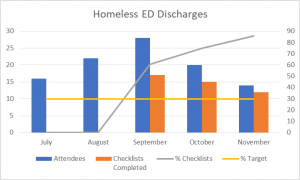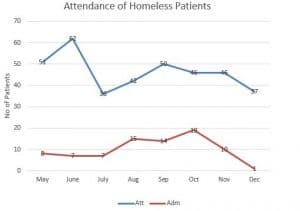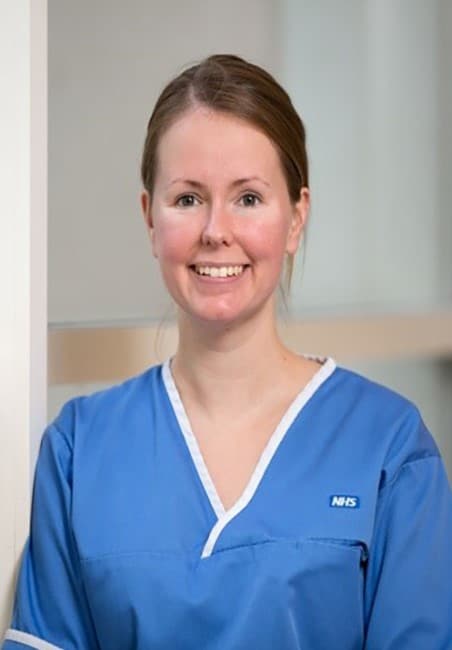Approximately 600 people with no fixed abode (NFA) attend the Emergency Departments (ED) at Gloucestershire Hospitals Foundation Trust (GHFT) each year. As with many trusts, we previously offered inadequate care and support to people who are homeless, often discharging them back to the streets at any time and with no support.
Our project focused on improving care to people who are homeless in ED and to simultaneously enact the Homeless Reduction Act (HRA). The HRA places a legal duty on A&E departments and inpatient wards to refer anyone who is homeless or at risk of homelessness within 56 days to a Local Authority. At the time the Trust had no processes in place to adhere to this legislation. The initiative focused on building relationships with local services and putting processes in place.
Interventions:
- Closely working with community services to create referral pathways suitable to meet all individual service demands.
- Created guidelines and Checklist Document (used since Sept 2019)
- Update patient information leaflet according to Trust protocols
- Multidisciplinary staff education using one to one teaching, focus groups and noticeboard presentations
- Work with IT to ensure identification of people who are homeless on presentation to the ED using the Trusts Trakcare system
Process measures:
- We used data from our Trakcare report and compared it to the number of completed checklists to give us a compliance rate
- Our target group was people who are homeless and those at risk of homelessness that were medically fit for discharge from the ED
- Those who did not wait for assessment were discounted from the figure as they were not able to give consent
- Limitations with accuracy of Trakcare mean NFA numbers are underestimated and do not account for ‘hidden homelessness’, or those that use old addresses or family and friend’s addresses All referrals to the Local Authority and local services were made with the consent of the patient.

Target and results
We were trying to initiate a large cultural change at what is the busiest time of year for the EDs. For this reason, we set an initial aim of 30% adherence.
However, at of the end of November (see chart) our compliance rate hit 87%! The referral pathways have only been in use since September 2019, so there is insufficient data to show a definitive trend. However, so far, the data does show a correlation between high adherence and reduced attendances.

Summary
We have seen a huge cultural shift in our Emergency Departments in attitudes towards people who are homeless. By teaching staff about the tri-morbidity of homelessness, staff feel empowered to identify the risks to patients experiencing mental ill health, physical ill health and drug and alcohol misuse sooner and implement support. The multi-agency working that is now happening in the EDs is leading to better outcomes for people who are homeless. As clinicians in an ED we may be the one and only health professional that person has contact with. It is vital that we identify homelessness and the associated risks and act on them. Every contact counts! The early intervention has the potential to break the cycle of homelessness and prevent people who are homeless needing to sleep on the streets.
Future aims
The chart below shows that to date we are seeing record low NFA attendances and admissions. Work for this initiative helped secure funding to further improve our services offered to people who are homeless in GHFT. This will be in the form of an extra dedicated housing officer to support inpatients and my taking on the role of a Trust Homeless Specialist Nurse. This will enable me to put more time into ensuring good care for people who are homeless by implementing guidance for staff across the trust and working collaboratively with outside agencies leading to better joined up care for this vulnerable group of people.
This project went through the Trust’s Quality Improvement Academy. Work for this project lead to me being awarded a Going the Extra Mile Award. I was also nominated for Healthcare Professional of the year at the annual staff awards. These inititives have raised awareness and lead to increased support for this project.
Shona Duffy
Homeless Specialist Nurse
Gloucestershire Hospitals Foundation Trust
Inspired and supported by Dr Pippa Medcalf’s Homeless Inpatient Initiative. Project co-managed by Sister Becca Shaw.
 Back to Resources
Back to Resources 
